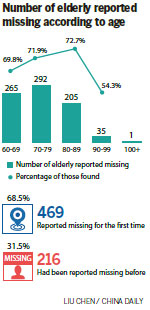 |
|
Guo Mingli, 87, places a ring on the finger of his 83-year-old wife, Wang Wen, on Sunday at a ceremony to celebrate 99 couples reaching their golden wedding anniversaries in Jinan, capital of East China's Shandong province. [Photo by Zhang Kang/For China Daily] |
More than 1,370 people age 60 or over go missing every day in China, according to a new report.
The White Paper on the Lost Elderly, released on Sunday, states that Alzheimer's disease and other forms of dementia are a major cause of such disappearances.
Up to 72 percent of senior citizens reported missing have trouble with their memory, while 25 percent have been diagnosed with Alzheimer's, according to Xiong Guibin, co-author of the report, which was jointly issued by NGO Zhongmin Social Assistance Institute and online content aggregator Toutiao.
What is compounding the problem in China is the large number of elderly people living alone in less-developed rural areas, whose relatives have migrated to cities to find better-paying jobs. These people are at greater risk, the report warned.

The research, released to coincide with Chongyang Festival, a national day to promote the Chinese tradition of celebrating senior citizens, showed that 84 percent of elderly people who go missing in a large city are found, yet the success rate drops to 50 percent in small counties and villages.
Since February, Toutiao has been running an app that helps families look for missing relatives, especially the elderly. The app sends alerts to users who come within 10 kilometers of where a missing person was last spotted.
Zeng Hua, who is in charge of the app, said the initial target was to find 100 people by year-end, yet so far the app has led to the recovery of 340 people, including more than 100 seniors.
"I know how these families feel. My own grandmother had Alzheimer's for 10 years, and we used to lose her four to five times a month," Zeng said, adding that his grandmother died at the age of 88 in 2012.
"Back then, I would never have thought of anyone else outside our family helping us."
Toutiao has signed a contract with police in Jinan, Shandong province, to share missing persons reports and spread the information online.
Dang Junwu, deputy director of the China Research Center on Aging, said more than 16 million people in China have a severe mental illness, mostly seniors.
"Everybody wants to be a good son and daughter and treat their old parents well, but the mental issue is not a problem money can solve," Dang said. "It calls for professionals."
By the end of last year, China had more than 222 million people age 60 or over - 16 percent of the population - while the average life expectancy is now about 76.
The China National Committee on Aging predicts there will be 400 million people age 60 or over by about 2033, growing at a rate of 10 million a year. This would mean senior citizens taking up more than a third of the population in 2050.
Coupled with this, an estimated 247 million people are leaving their hometowns to live and work in cities, leaving elderly relatives behind.
